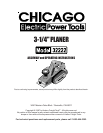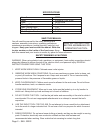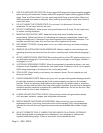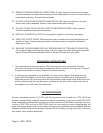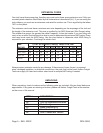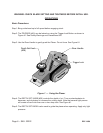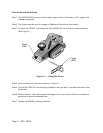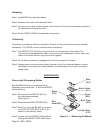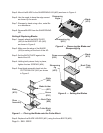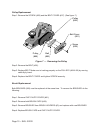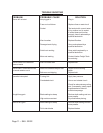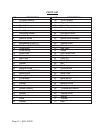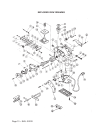
21. REMOVE FOREIGN OBJECTS FORM STOCK. All nails, screws, and all other hardware
must be removed from wood before planing. Never allow planer to come in contact with any
metal when operating. This will chip the blades.
22. DO NOT LEAVE BLADE EXPOSED WHEN NOT IN USE. Never lay planer on its shoe
while cutter head is exposed. Retract cutter head entirely when storing.
23. DO NOT COVER OR ALLOW AIR VENTS TO BECOME BLOCKED. Motor requires
sufficient ventilation to prevent overheating.
24. KEEP ALL GUARDS IN PLACE. Do not operate if a guard is functioning improperly.
25. KEEP CHIP CHUTE CLEAR. Make sure there are no obstructions that would prevent the
ejection of chips. Always unplug tool and let cutterhead reach a complete stop before
clearing out chute.
26. RELEASE TRIGGER IMMEDIATELY AFTER REMOVING CUTTERHEAD FROM STOCK.
Do not leave trigger locked on after lifting. Only use trigger lock when planing for extended
period of time and when cutterhead will be in constant contact with your stock.
GROUNDING INSTRUCTIONS
1. This machine has a three prong plug. The third prong (round) is the ground. Plug the
machine’s cord only into three-prong receptacles. Never cut off the round prong. Cutting off
the ground will result in a safety hazard and void the warranty.
2. If a three-prong receptacle is not available, you may use an adapter. Extending from the
male end of the adapter, you will find a ring connector or wire lead with a ring connector
where the ground (round prong) would be. Remove the center screw of the outlet cover and
put the screw through the ring connector and back into the hole of the outlet cover. Do not
over tighten or you will crack the outlet cover.
VOLTAGE WARNING
Common household current is 110-120 volts. As long as your tool is rated from 110V-120V there
will be no complications using this tool with household receptacles. If your tool is rated 220V-240V
it has a completely different style of plug and must be used with a 220V-240V receptacle. Never try
to plug a 110V-120V tool into a 220V-240V circuit (or vice-versa) or serious complications will
arise, including possible injury to the operator. The plugs and receptacle have completely different
shapes to prevent this from occurring accidentally. Do not modify your plug in any way. If you have
any doubts, call a qualified electrician.
Page 4 -- SKU: 32222



